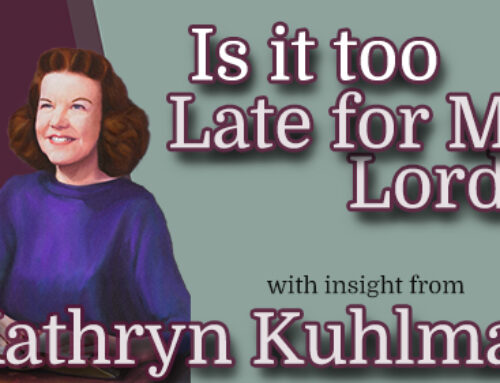Kathryn Kuhlman’s Insight into- Those who wait
There are certain verses that everyone who becomes a believer knows and loves, including:
“But those who WAIT on the Lord SHALL renew their strength; they shall mount up with wings like eagles, they shall run and not be weary, they shall walk and not faint.”
Isaiah 40: 30
This rich treasury trove is filled with promises that every believer so desperately needs. Oh, if we have eyes to see these verses would be a delight. As believers, we need these promises and the longer you have been running the race, the more you need these promises.
Kathryn Kuhlman said:
Most of us have delighted to repeat this promise again and again as a comfort and a means of strength to our fainting hearts. But are we finding the blessings that are mentioned here to be common in our lives? Let’s face it. Too many times I feel that we run and we are weary, we walk and we faint.
When I was a teenager, I recall how we were made to run around the school three times. Being a sprinter, I would start off strong, but all too quickly, I became weary. As we run the spiritual race set before us, some days are so easy to run in fourth gear, but then there are days and seasons we seem stuck in first.
Kathryn said:
As we study these first six words carefully—“They that wait upon the LORD”—we see that we have just one condition to meet. That’s all. It’s very simple. But upon that single condition four glorious blessings hinge.
As we read this verse, we see that the promise has one condition, that we wait. Then as Kathryn explained for those who do meet the condition:
Notice that the second word after the condition is “shall.” God has given the promise, and there is power and authority in His promises.
So, if we will truly wait, then He shall surely provide. Yes, the promise is sure if we meet the condition. Let us do a deeper dive into this verse.
To wait, “qavah,’ means to look, to expect, to wait eagerly for, and to wait in line for.
Renew, “chalaph,’ means to come anew or sprout
Weary, “yaga,’ meaning to grow weary from labor or toil
Faint, ‘Ya aph,’ meaning to become fatigued to the point of fainting
So, we are to come and expect an exchange in the Secret Place. Our weakness and breaking points for His strength and renewing. Oh, how we need to come and be replenished, renewed, and restored. A good athlete quickly learns the importance of such things if they are to run a long race.
But we come in faith. Kathryn explained:
Let me try to explain. From the Word of God I know that if any man or woman has even the smallest measure of faith, the results of that faith will be manifest.
Jesus explained the power of faith the size of a mustard seed, so we must get our eyes off the size of our faith and get them fixed on the greatness of His power. Kathryn added:
So it is with this glorious promise given to us by the LORD through the prophet Isaiah. If you are still running and are weary, if you are walking and are fainting, then either you have not met the condition or you do not understand the meaning of the promise.
Faith is the tabletop, but a tabletop needs legs to stand. It needs at least three legs, and we must have at least things for our faith to stand, including:
- We know His heart, and so we know His motivation behind the promise and that He has our best intentions at heart
- We know His promises or what He seeks to provide
- We know His character and faithfulness
Knowing His promises comes through the Word, but you must also know that you can trust Him to fulfill His promise. Further, the walk of faith demands trust, so we must know we can trust Him and that He is good. These legs are built in the Secret Place as we invest time to abide in His Word and allow Him to reveal Himself and speak through His Word.
A fourth leg comes as we learn to listen and do the Word. Kathryn explained:
“They that wait upon the LORD shall. ” The secret is found in that one condition— waiting. Before I go any further, let me point out that waiting and praying are different things. Prayer always precedes waiting, and the two—prayer and waiting—must go hand in hand. Sometimes I wonder just how much most folk know about praying, and I believe you will appreciate the following example and see my point.
If we go back to Isaiah and read chapter forty, verse thirty, and then continue, we would read:
“Keep silence before Me…”
Isaiah 41: 1 a
Here we learn more and gain understanding on the call to wait. For we must know how to wait! As Kathryn explained, we may start with prayer, but there must come a time of simply being still and knowing Him as God. She went on to say:
When you pray, say something! Be specific and definite in your prayer. When you talk to God, talk to Him in the same way you would if you could literally see Him. If you have a need, express it. That, my friend, is true prayer. Waiting on the Lord, however, is not the same as prayer. Waiting—a condition of this glorious promise—means to be silent, to be still, saying nothing.
This is a call to obedience and yielding. We like to do things our way and always feel we have determined the best and right way to do everything. But learning to cast aside ourselves and simply, in obedience, choose to do the Word, is powerful. Then we can take it even further and delight to do it that it may be an expression of our love towards Him.
We live in a world of noise. I have gone and stayed in remote places and one thing you so quickly become aware of is the lack of noise. Kathryn said it this way:
This age of noise and intense activity has so saturated our beings that even our souls have become noisy.
This generation needs constant stimulation of the senses even the thought of waiting in silence comes with great dread. But if we learn to surrender to the Holy Spirit, He will meet us in the place of our weakness and reveal His strength.
As Kathryn then explained:
Now after you have prayed, be still, be silent, be quiet; but in that time of waiting, be filled with expectancy and hope. The Psalmist said, “My expectation is from him” (Psalm 62:5). In your waiting before the Lord, you are not waiting as an idler or one who is lazy. No, beloved. In those hours of waiting and silence, there is an expectancy. You prayed, and you prayed believing. Now you are in that state of waiting with great expectancy for Him to do that which you have asked in faith believing.




